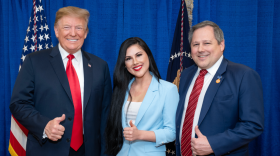Christian Schlaefer wants to restore rural Iowa communities, like his small hometown of Lakota, located in Kossuth County near the Minnesota border.
“You look at our main streets and you see that there aren't really businesses anymore. There's a lot of beautiful buildings still there, slowly falling into disrepair. We don't really have anything left in those towns,” Schlaefer said. “And I think we need to revitalize our towns. I think the individual who is going to do that needs to really have a strong resolve and will to get that done when they actually get to D.C.”
The 29-year-old is a farmer, software consultant and volunteer firefighter. He said he was inspired to run for office because he thinks policies in Washington have held back Iowans and politicians have failed on issues of immigration and cultural values.

“The first thing is the way the federal government operates — the overspending, the misuse of funds — what amounts, in many ways, to robbery of the American taxpayers, and then what those funds are used for,” Schlaefer said. “I think there are a lot of issues that are very controversial here in the United States, and I don't think that our nation is necessarily acting in the way that we are intended to act. So I really do think we need to return to faith being one of our biggest guiding forces.”
Schlaefer believes President Donald Trump’s policies are a step in the right direction. He supports the administration's actions to secure the border, fix crime-ridden cities and fight for an economy where farmers, workers and manufacturers “can truly thrive again.” However, he cautioned that a movement too reliant on one man’s political drive isn’t enough.
Schlaefer's views on property rights and eminent domain
One of the biggest issues facing rural Iowa is eminent domain, which Schlaefer called a “touchy subject” and one that personally impacts him.
“My wife and I actually homesteaded a property here in Lakota. We took a chunk of land and we built a house here with our own two hands. And when that pipeline is built, if they use eminent domain, they will come to my property and demand they put that through,” Schlaefer said, referring to Summit Carbon Solution's proposed carbon sequestration pipeline. “And, I think that's something that's really questionable. As Americans, we have freedoms. And one of those freedoms is from the government stepping in and taking away things like that.”
Summit has plans to build a network of pipelines that would collect CO2 emissions from ethanol plants in the region for storage underground in North Dakota. The project is designed to help ethanol producers reach markets for low-carbon fuels. Schlaefer said lawmakers need to find a balance between making sure Iowa energy can continue to thrive while respecting the rights of people and safety protocols.
“As a firefighter, we're trained that if there's a carbon burst on those pipelines, we don't go within miles of it because we don't have the resources to help out if there is a disaster,” Schlaefer said. “So, to force somebody to put something on their land that we can no longer assist with after that happens, I think that's something that we should not be doing at such a scale.”

According to Schlaefer, the debate over property rights should be addressed through a federal law.
Proposed CO2 pipelines would lower carbon emissions for ethanol produced by companies, like Valero Renewables, which operates an ethanol plant in Lakota. It's the community’s biggest employer.
“These are the livelihoods of so many people,” he said. “If carbon capture could exist without that eminent domain use, then maybe that's viable. But again, I think there's better solutions, like removing the conditions for which carbon capture needs to be occurring in the first place."

Other Republicans and Democrats in the race
Schlaefer joins a growing field of candidates who want to replace incumbent Rep. Randy Feenstra. Feenstra has initiated a campaign for governor of Iowa, but has not officially announced he’s running.
“I’ll set myself apart from the other people in the race simply by the passion of my message. I truly believe in the things that I'm talking about," Schlaefer said. "I think as Iowans meet with me and talk to me, they will recognize and they get the sense of that."
Schlaefer said anyone who wants to serve in office should agree to a debate so voters can hear what they stand for.
“Debates have kind of gone out of favor in congressional races, and I'm not really sure why, but I believe that people have the right to hear directly from their candidates in a kind of unchecked and non-marketing kind of way and make a determination from themselves whether or not that person really represents their voice,” he added.
Schlaefer will face off in a primary next year with the four other Republicans in the race so far. There are three Democrats that have thrown their hats in the ring.
The other GOP contenders include Chris McGowan with the Siouxland Chamber of Commerce, Iowa House Majority Leader Matt Windschitl of Missouri Valley, farmer Kyle Larsen of Humboldt and Iowa Tea Party Founder Ryan Rhodes of Ames.
The Democrats looking to move on to the general election are former state lawmaker and prosecutor Dave Dawson of Lawton, stay-at-home mom Ashley WolfTornabane of Storm Lake and Stephanie Steiner of rural Sutherland.
“Whoever steps into this role really needs to be driven by a resolution to actually achieve things, actually get things done,” Schlaefer said. “You know, if you truly believe in something, you can't sit by for 10 years and watch it continue to happen and simply talk about doing something about it.”
The 4th Congressional District is Iowa’s most conservative and largest, with 36 counties mainly in the western and northwestern part of the state.






